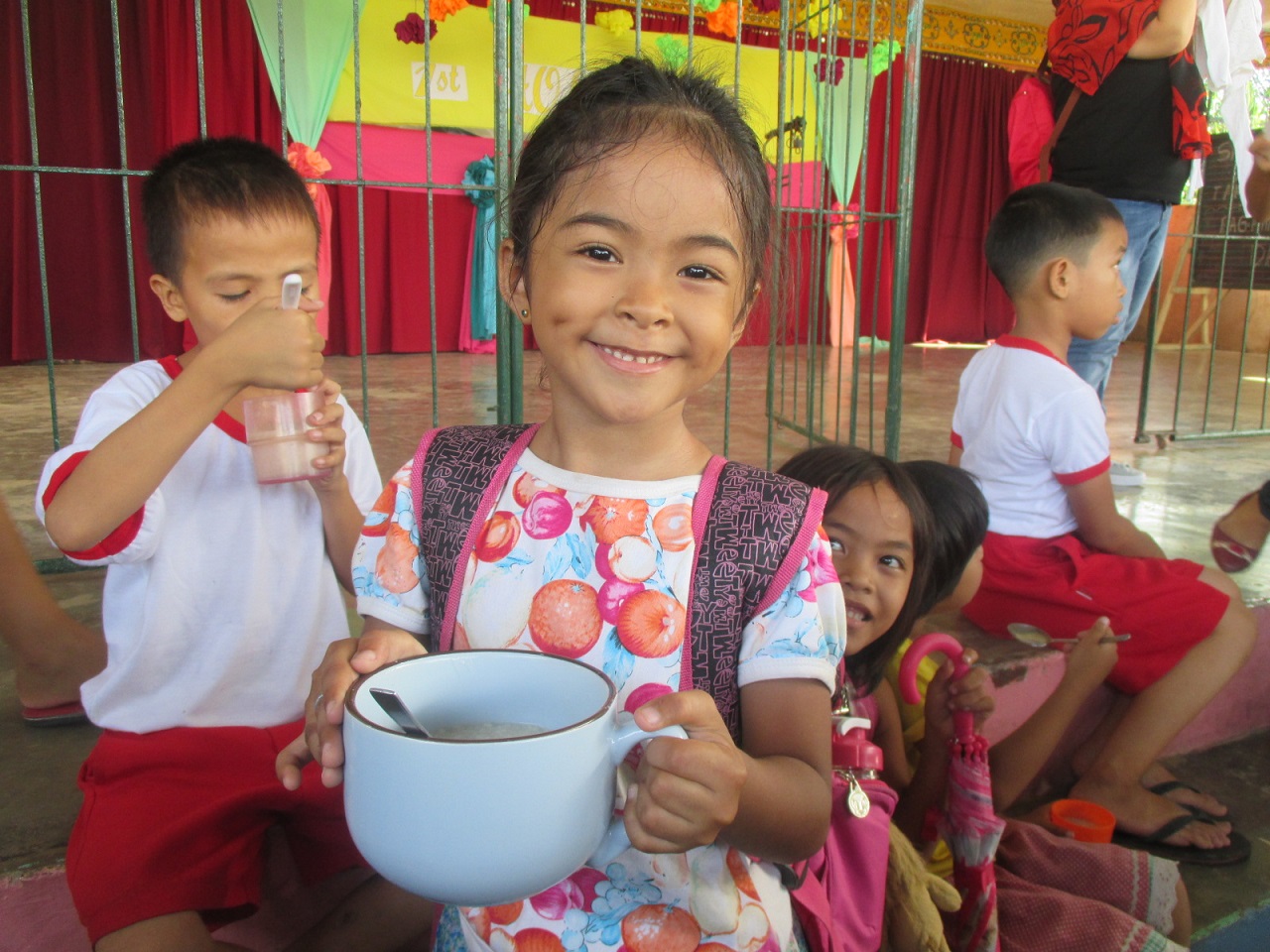
Humanitarian needs continue in Marawi as transition planning begins
Nearly 360,000 remain displaced by the conflict in Marawi, with a majority staying with relatives and friends in Lanao del Sur and Lanao del Norte. Especially vulnerable are those seeking shelter in evacuation centres, three months in. Many have voiced their wish to return home through their leaders to the Government.
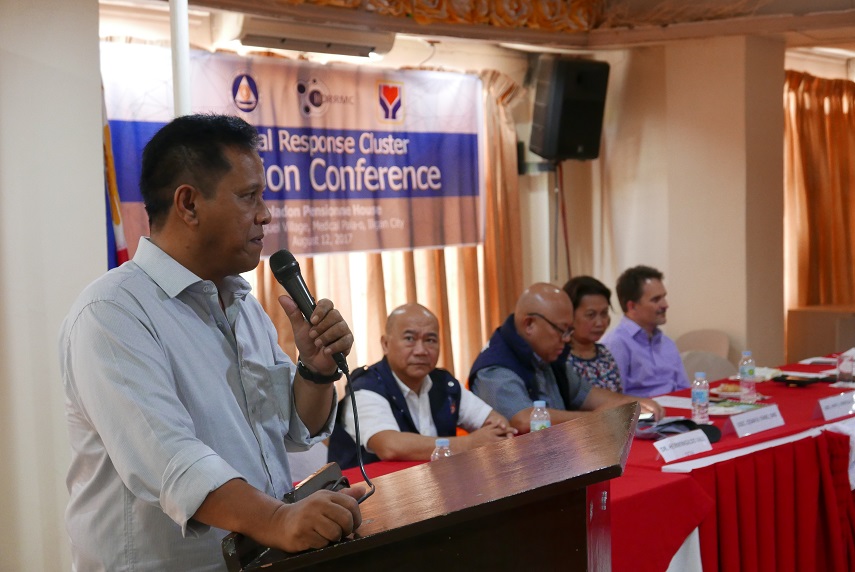
Credit: OCHA/T. Arao Iligan City, Lanao del Norte (12 August 2017) - Mr. Haroun Lucman, Vice Governor, Autonomous Region in Muslim Mindanao (ARMM) and Regional Secretary, DSWD-ARMM delivering his remarks at the National Response Cluster Transition Conference
National Response Cluster Transition Conference
The President signed on 28 July an administration order to establish Task Force Bangon Marawi (Rise, Marawi), which will lead the transition from relief to recovery in preparation for the end of the conflict and the return of those displaced. On 12 August, a conference in Iligan City was led by the National Response Cluster to ensure humanitarian needs are addressed during the transition. During the conference, a transition framework was outlined and aid agencies and government departments presented best practices in local humanitarian response and recovery. This conference also formally ended the National Emergency Operations Centre that was coordinating the emergency phase of the response. The conference brought together local, regional, national government agencies, CSOs, INGOs and UN agencies involved in humanitarian and development work.
One of the key outcomes of the conference was the recognition that humanitarian assistance will continue while people are displaced. The recovery effort will include peace building and consultation with affected communities, engaging the youth and working closely with all stakeholders. The Task Force will meet regularly and welcomes the support of humanitarian and development assistance through its coordination structure.
The transition will be be led by the Undersecretary of National Defense, Cesar Yano, as the task force's executive director supported by the Office of Civil Defense as Secretariat. Government agencies and partners will work under five sub-committees to address reconstruction, housing, peace and order, health and social welfare, and livelihood. There are also three over-arching supprt groups to manage information management, resource mobilization and legal matters to address land rights of internally displaced persons (IDPs) as they return to Marawi.
Risks IDPs face as they return home
A major issue in the return process that was acknowledged during the conference is the life-threatening risk and exposure to mines and unexploded ordinance (UXO) in the conflict zones in Marawi City. Currently, the IDPs can visit their homes within a military cleared areas. This is done in coordination with Task Force Ranao, wherein they are accompanied by a composite team to check their homes and retrieve belongings. For their safety, IDPs will need mine risk education prior to their journey home.
The Swiss Foundation for Mine Action (FSD) has educated IDPs on the mines, UXO and improvised explosive device (IED) risk education in several evacuation centres in Lanao del Norte. Together with local authorities, they have also trained 18 volunteers and provided UXO safety training for relief agencies.
Limited humanitarian access to remote areas
Access continues to be limited along the eastern side of the Lake Lanao due to security constraint. The International Committee of the Red Cross, in partnership with the Philippine Red Cross (PRC) continues to support the IDPs at the eastern shore of the lake. It has distributed two weeks worth of food and household essentials to 7,000 displaced people in the municipality of Tamparan, Lanao del Sur. It also supported the public hospital with essential medical supplies. A mobile water-purification system to improve the drinking water supply was also set-up within the hospital compound.
With the government efforts shifting from relief to recovery and rehabilitation, the people displaced outside of Marawi City especially those living around the lake are now encouraged to return to their respective municipalities. The IDPs are advised to register with their respective Municipal Social Welfare and Development Officers (MSWDO) as they return to ensure they continue to receive the necessary relief items and services.
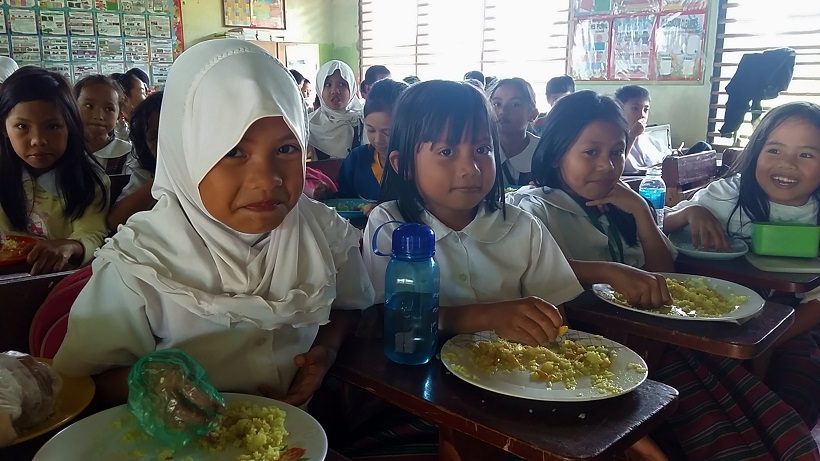
Credit: WFP/M. Cezar Pantar, Lanao del Norte (25 July 2017) - The World Food Programme together with the Australian Government through the Department of Foreign Affairs and Trade, is able to provide emergency school meals to 60,000 students in more than 150 public primary and secondary schools in Lanao del Norte and Lanao del Sur.
Educational needs of displaced children
According to the Department of Education in the Autonomous Region in Muslim Mindanao (DepEd-ARMM), over 20,000 students were displaced during the Marawi conflict. As of 2 August, most of the IDP students are enrolled in Region 10, with nearly 16,000 students.
There are still a significant number of children in evacuation centres and host communities that are not enrolled in school. In July, UNICEF provided technical support to DepEd- ARMM in tracking unenrolled children in evacuation centres and host communities in Saguiaran municipality. This paved the way in drafting the guidelines in tracking children hosted in other locations. The entire displaced school learner community must be counted to ensure support and follow-up.
Local authorities together with humanitarian partners are supplementing school needs by providing psychological first aid, learner and teacher supplies, hygiene kits and implementing a school feeding programme. Eleven temporary learning spaces were set up in various locations to ensure that learners can continue their education while in displacement. There is a great need for teachers for overcrowded classrooms and learning spaces. According to DepEd-ARMM, over 2,900 teachers were displaced by the conflict, with most of them unable to return to their school districts.
DepEd-ARMM has laid out several programmes in support of education for IDPs. The Brigada Eskwela sa Marawi (The School Brigade in Marawi) will support the repair of damaged school buildings, prepositioning of temporary learning spaces, and the provision of psychosocial support, textbooks and other school equipment and supplies. Operation Balik Eskwela (Back to School) aims to support those who left school to flee from the conflict to resume their education. In the Adopt-a-School program, donors may designate a school for reconstruction.
The role of civil society organizations in Marawi humanitarian response
Since the start of the Marawi conflict, civil society organizations (CSOs) have played an important role in the response. Complementing the efforts of the government, CSOs participated in the cluster system and initiated a coordination mechanism utilizing the mandate of the National Anti- Poverty Commission-Victims of Disaster and Calamities' sectoral representation in the NDRRMC as provided for under the R.A. 8425 and R.A. 10121. The CSOs led various initiatives to dialog with government leaders, which resulted in the Ranao Rescue Team (RRT), Bangon Marawi consultative council of traditional Leaders, Ulama and CSOs, and the Women Stakeholders Forum, among others.
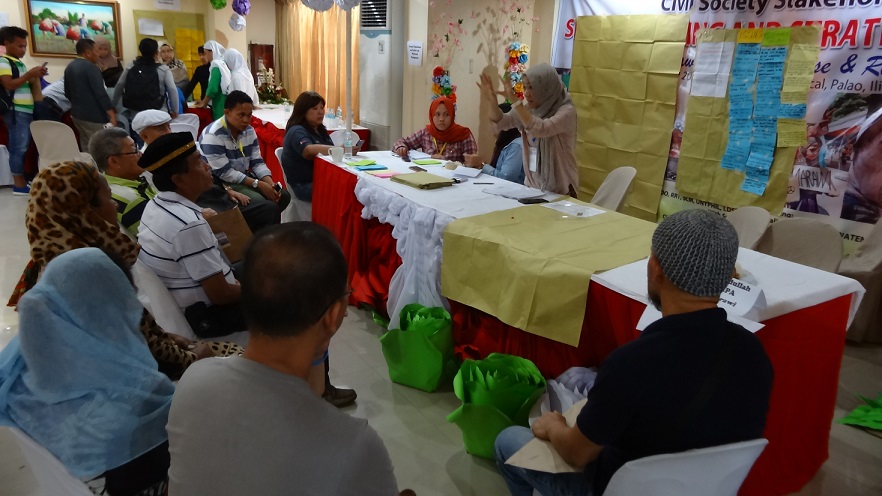
Credit: CSO Workshop Secretariat Iligan City, Lanao del Norte (8 August 2017) - WFP staff facilitating a visioning session during the CSO workshop.
While acknowledging the positive response to various dialogues and advocacy of needs and concerns of IDPs and affected communities, there are still needs, issues and concerns to be addressed during the transition phase to recovery and rehabilitation. Ensuring their plans and initiatives are incorporated in the transition phase, the CSOs stakeholders produced a shared visioning and strategic plan on 8 August, which they presented to the Task Force Bangon Marawi Executive Director, Usec. Yano for adoption. Usec. Yano also assured the CSOs they will have a representation in the sub-committees to ensure that the plan of action will be inclusive, culturally sensitive and transparent.
Access continues to be limited along the eastern side of Lake Lanao due to security constraints. The International Committee of the Red Cross, in partnership with the Philippine Red Cross continues to support the IDPs at the eastern shore of the lake, particularly those staying with relatives.
Since the start of Marawi conflict, civil society organizations (CSOs) have played an important role in the response.
The vulnerable within the vulnerable: meeting the needs of displaced persons with disabilities
As the conflict becomes protracted in Marawi, access to health services is a priority for those displaced. Especially vulnerable are those with disabilities who are staying at evacuation centres, where there are significant barriers to basic health services, and the availability of specialized care and rehabilitation for the disabled are limited. Humanitarian assistance often prioritizes major health concerns, which during the Marawi conflict has been skin diseases, respiratory infections and acute watery diarrhoea.
Access to appropriate health and rehabilitation services is a human right included in the Convention on the Rights of Persons with Disabilities, which the Philippines signed in 2007 and ratified in 2008. Prior to that, the Philippines also enacted an accessibility law, which requires buildings to install facilities and devices to enhance the mobility of disabled persons. Despite the legislative support, people with disabilities are frequently sidelined during health sector planning in evacuation centres.
On 10-14 July, Handicap International’s emergency response team conducted an assessment in Iligan City, Lanao del Norte, to identify the evolving needs of internally displaced persons (IDPs), particularly those with disabilities, affected by the Marawi crisis. They visited four communities of home-based IDPs in Barangays Saray, Tambacan, Santa Rosarion and Santiago. They also interviewed evacuation centre-based IDPs in Barangays Santa Elena and Maria Cristina and a community-based IDP in Maneerah Integrated School from Barangay Ubaldo D. Laya.
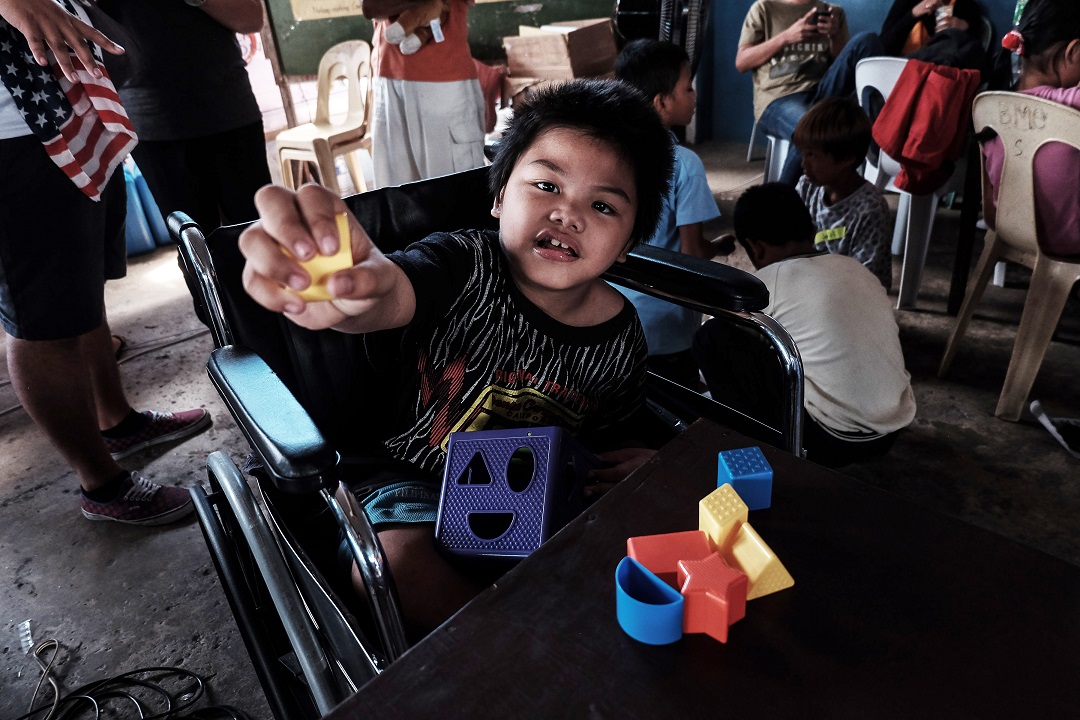
Identifying needs of the disabled in displacement
The overall needs assessment revealed that there are a number of persons with disabilities who have not been properly identified and have been overlooked during the registration of IDPs. No government or humanitarian agency is collecting information on the needs of persons with disabilities, and vulnerable persons, including those with disabilities, have difficulty accessing basic needs, and no agency is currently addressing specific needs. Existing health services in the evacuation centres did not cover rehabilitation services.
There is also a need for evacuation centres to comply with accessibility laws and the principles of universal design for persons with disabilities. In some centres, some persons with disabilities, older people and persons with severe medical conditions are unable to use WASH facilities. Entry and exit ways to the facilities lacked accessibility features such as handrails and ramps. They depended on their family for assistance with personal hygiene. The IDPs in need also have very limited access to mobility and assistive devices, such as a cane, wheelchair, crutches or communication materials for persons with sensory impairments. Handicap International noted that some of the wheelchairs provided are inappropriate in measure and are not usable.
A comprehensive assessment of all vulnerable persons, including persons with disabilities is also needed, Training those conducting the assessment on using inclusive facilitation techniques is also important.
Training governmental and non-governmental humanitarian agencies in an inclusive approach to assistance in both emergency and recovery phase is also needed. An assessment of the accessibility of facilities and infrastructure such as shelter and WASH facilities and the provision of technical support to ensure compliance of accessibility laws was also recommended. Handicap International recognizes the need for a principled, coordinated and inclusive humanitarian assistance and aims to provide technical support on inclusion in humanitarian and recovery actions to government and non-government organizations that have interventions related to the crisis. They also aim to provide technical support on how to correctly identify persons with disabilities and how to meet and address the specific needs of IDPs including persons with disabilities.
The overall needs assessment revealed that there are a number of persons with disabilities who have not been properly identified and have been overlooked during the registration of IDPs.
Emergency response funding for displaced by Marawi conflict
Almost a month into the Marawi conflict, the Humanitarian Country Team (HCT) was concerned to learn from the Health Cluster that over 100 cases of diarrhoea were recorded in Iligan City evacuation centres between 13 and 15 June. An additional 98 cases of diarrhoea were recorded in area hospitals between 28 May and 20 June. Seven of the cases were confirmed with cholera. In addition, 5 children from evacuation centres in Iligan City were diagnosed with suspect measles.
While the Department of Health has created a task force to monitor diarrhoea cases, improve surveillance and promote hygiene, and it has initiated vaccination, HCT cluster coordinators for Health, WASH, CCCM and Protection concluded on 19 June that immediate reinforcement was needed to prevent an outbreak of water-borne and communicable diseases, and a request for support from United Nations Central Emergency Response Fund (CERF) was initiated. CERF is one of the fastest ways to support rapid humanitarian response for people affected by natural disasters and armed conflict.
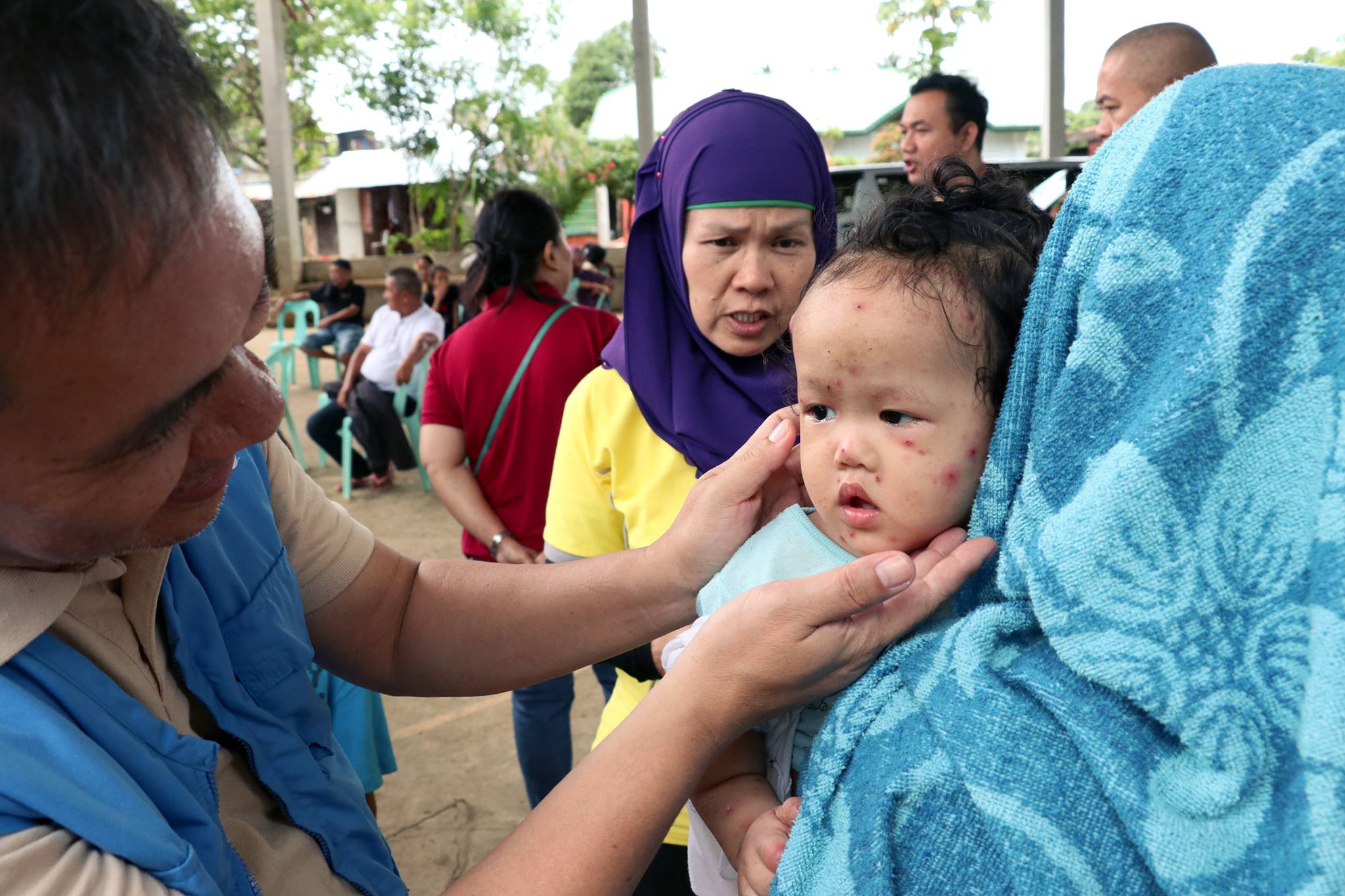
Focus on WASH and health services
It was envisioned that for the Marawi crisis, CERF support will jump-start the establishment of emergency disease surveillance in accessible, most-at-risk IDP sites, as well as ensure access to health services for affected populations until health facilities are able to continue the provision of services. Given the risk for a diarrhoeal disease outbreak, the CERF funds will also focus on a rapid scaling up of efforts to improve sanitation and hygiene conditions. In order to alleviate the congestion in IDP sites and eliminate conditions conducive to disease outbreaks, CERF funds will be used for displacement tracking and to augment local and regional governments’ capacity to manage evacuation centres and collective sites. IDPs themselves will be organized to take camp leadership roles to strengthen referral pathways for public health and protection needs of IDPs.
Protection monitoring and reporting, information management, registration of IDPs, delivery of legal services, and issuance of civil documents will also be strengthened to improve the protection environment, ensuring non-discriminatory and equitable access to basic and protective services in coordination with the government and partners.
The strategic objective of the CERF request was to jump-start activities that prevent the outbreak of communicable and water-borne diseases to prevent unnecessary loss of lives. Participating agencies have prioritized four municipalities that are accessible, less served, and most at risk of disease outbreaks as a common target for high impact. At the same time, the most urgent sanitation, camp coordination and camp management, and protection needs of the IDPs in these municipalities will be addressed. The activities will be implemented over six months.
CERF support will enable early detection and rapid response to threats posed by communicable diseases including cholera and measles. Vulnerable populations will have access to critical health services, including reproductive health, immunization, nutrition, and mental health and psychosocial support.
The CERF funds will ensure actions can be taken to increase access to sanitation facilities, thereby reducing the potential for diarrhoeal disease and other outbreaks.
Six projects totalling US$2.5 million were approved for CERF: UNICEF received $600,000 for WASH services; UNFPA received two grants of $250,000 each for reproductive health services and protection for women and girls; UNHCR received $450,000 for access to rights and protection for IDPs; IOM received $500,000 for camp coordination and camp management; and WHO received $425,000 for health services. These rapid delivery projects will end by October.
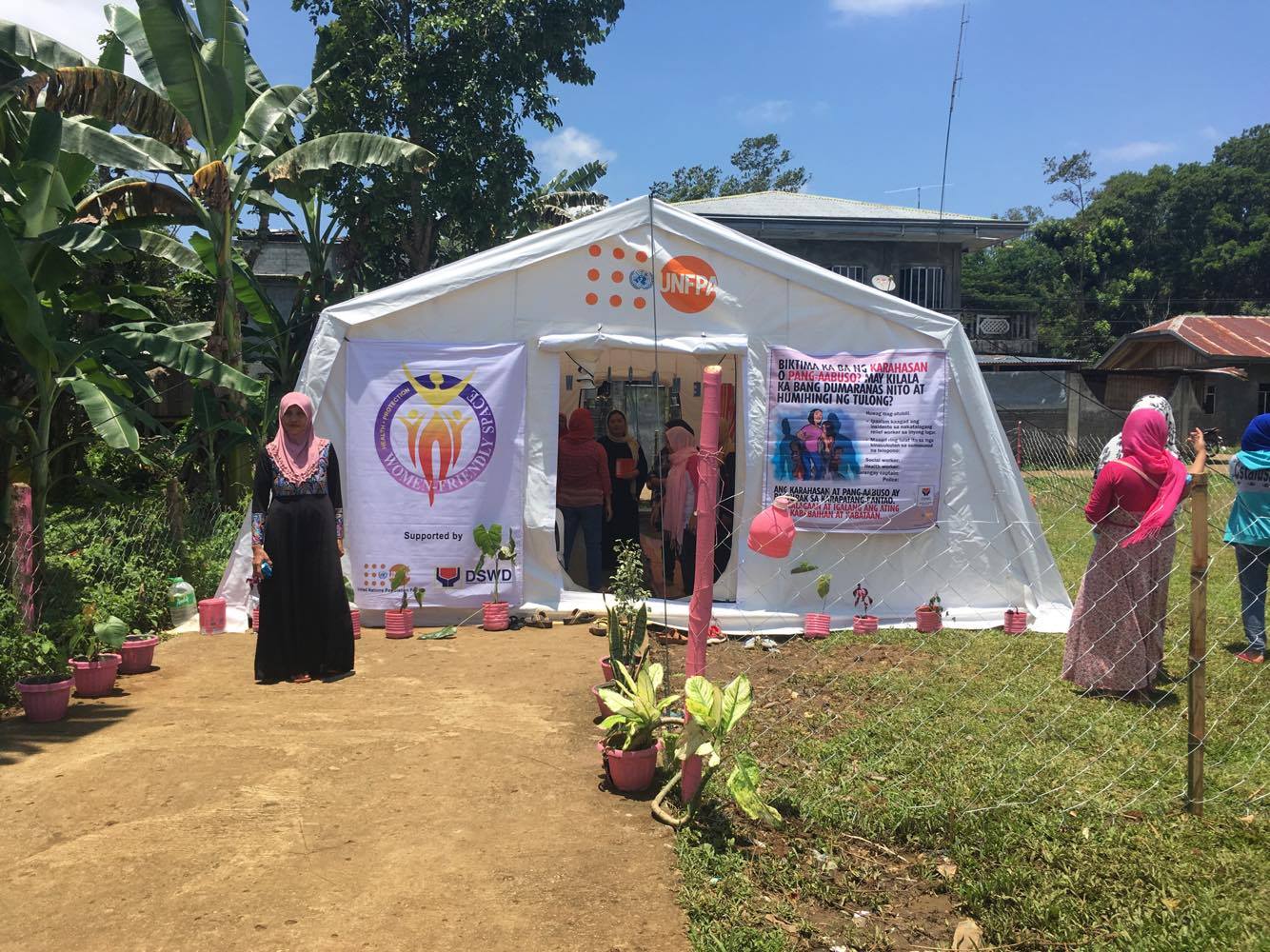
WHO and UNICEF programmes
WHO and its implementing partner, the Mindanao Organization for Social and Economic Progress (MOSEP), are addressing the need of displaced populations who have little or no access to health services by deploying mobile teams in the municipalities of Saguiaran, Pantar, Pantao Ragat and Balo-i. The mobile teams provide essential primary health care services including medical/surgical consultations, immunization, nutrition screening, mental health and psychosocial support, reproductive health, health promotion and advocacy. Health information gathered by the teams widens the coverage and protection of disease surveillance to IDPs and host communities alike.
UNICEF has been providing essential intervention for water, sanitation and hygiene (WASH) to prevent morbidity and mortality due to diarrhoea and other water-borne diseases. The provision of WASH support is especially needed as ARMM has the lowest percentage of households with access to safe drinking water and sanitation facilities. According to the 2017 Update and Sustainable Development Goal Baselines, only 62 per cent of ARMM households have access to basic water services and only 22 per cent of households have their own hygienic toilets, numbers which are below the national average of 91 per cent and 75 per cent respectively.
UNICEF and its partners have provided hygiene and water kits, water storage bladders, jerry cans, and water purification tablets. Some 200 temporary toilets were also constructed to ease the sanitation conditions in overcrowded evacuation centers. To date, more than 11,000 individuals, including children, were provided with improved access to clean water and toilet facilities.
Taking into consideration religious and cultural beliefs of the affected population, UNICEF in coordination with the Department of Health and other communication partners developed key messages on sanitation and hygiene practices which are being broadcasted on mass media to reach close to 200,000 people.
With most of the IDPs being Muslims, the Islamic concern for maintaining the purity and cleanliness of one’s physical and spiritual self are clearly expressed in the Hadiths, or the accounts of the sayings, actions and habits of the Prophet Muhammad. The WASH cluster conducted a consultation workshop with the United Imam of the Philippines, Ulama League of the Philippines and the Madaris, for the integration of Islamic teachings with hygiene promotion activities. The religious leaders highlighted the important Islamic teachings that can be linked to WASH messaging such as the strict prohibition in urinating in stagnant water, and using it for bathing; and the warning against relieving (openly defecating) in a watering place, by the roadside or in the shade. Islam also instructs that it is charitable for Muslims to maintain cleanliness by ridding the streets of impurities and filth. Muslims are further urged to perform ablution not only in offering prayers but also before eating and sleeping.
The WASH cluster is pre-testing the IEC materials and will train religious teachers in conducting hygiene promotion sessions in evacuation centers and for home-based IDPs.
It was envisioned that for the Marawi crisis, CERF support will jumpstart the establishment of emergency disease surveillance in accessible, most-at-risk IDP sites, as well as ensure access to health services to affected populations until health facilities are already able.
The CERF funds will ensure actions can be taken to increase access to sanitation facilities, thereby reducing the potential for diarrhoeal disease and other outbreaks.
UN support in addressing Avian Influenza outbreak
On 11 August 2017, the province of Pampanga in Central Luzon, Philippines was placed under a state of calamity after the Government detected avian influenza in two poultry layer farms in the area. A week later, two municipalities in the neighboring province of Nueva Ecija also reported the presence of the disease. On 24 August the Department of Agriculture (DA) announced that samples sent to the Australian Animal Health Laboratory tested positive for sub-type N6, which confirms the presence of H5N6 avian influenza virus in the country.
The Bureau of Animal Industry (BAI), however, stressed that the possibility of transmission to humans is very low, as observed in other countries. As part of its containment measures, the Government has declared areas within 1-km of affected farms as quarantine zones, while another 7-km radius has been made part of the controlled zones. According to DA, 1.15 million fowls are being culled in the affected areas, including chickens, ducks, quails and pigeons, to stop the spread of the disease. Efforts are being made to compensate farmers for every culled fowl, and to help the poultry industry to recover from the crisis. Further, the Department of Trade and Industry and Department of Labor and Employment have been requested to fund livelihood projects.
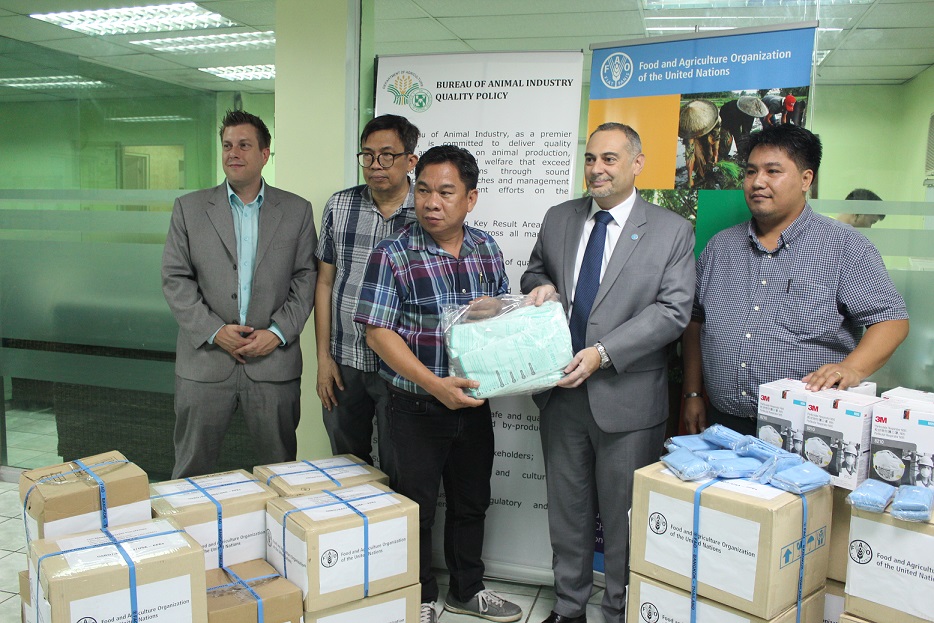
Assistance from FAO and WHO
As the specialised UN agency mandated to support member states in fighting plant and animal diseases, including those that are trans-boundary in nature, FAO is focusing on providing technical assistance at the request of BAI. It has deployed two animal health experts, a lab specialist and a socio-economist who have so far assisted in providing technical guidance in setting the depopulation protocol, recommendations for disease prevention and control, and in the initial assessment of the economic and market situation faced by poultry farmers, among others. Additionally, personal protective equipment, disinfectants and sprayers, test kits for Avian Influenza sub-types and other related laboratory supplies are being provided at the request of BAI, through the FAO Emergency Centre for Transboundary Animal Disease based in Bangkok, Thailand,with funding contribution from United States Agency for International Development. FAO also facilitated the sending of samples to AAHL in Geelong, Australia, which is a reference laboratory of the World Organisation for Animal Health (OIE) for highly pathogenic avian influenza.
The World Health Organization is working closely with the Department of Health (DOH) and FAO to support to health sector response to the H5N6 avian influe nza outbreak in Luzon. So far, there have been no confirmed human cases of avian flu. The DOH is leading the response on the human health side, with a focus on protecting transmission of infection to humans, early detection of possible human cases, and preparedness for treatment.
As the specialised UN agency mandated to support member states in fighting plant and animal diseases, including those that are trans-boundary in nature, FAO is focusing on providing technical assistance at the request of the Bureau of Animal Industry..
Standing together for Marawi on World Humanitarian Day
UN agencies together with government and humanitarian partners staged Stand- Together events in Manila and at the ARMM compound in Cotabato City. A moment of silence and lighting of candles of hope in Manila, and a message wall of support in Cotabato were acts of solidarity to highlight the continuing humanitarian crisis in Marawi. The events were held in commemoration of World Humanitarian Day, held every year on 19 August to pay tribute to aid workers who risk their lives in humanitarian service, and to rally support for people affected by crises around the world.
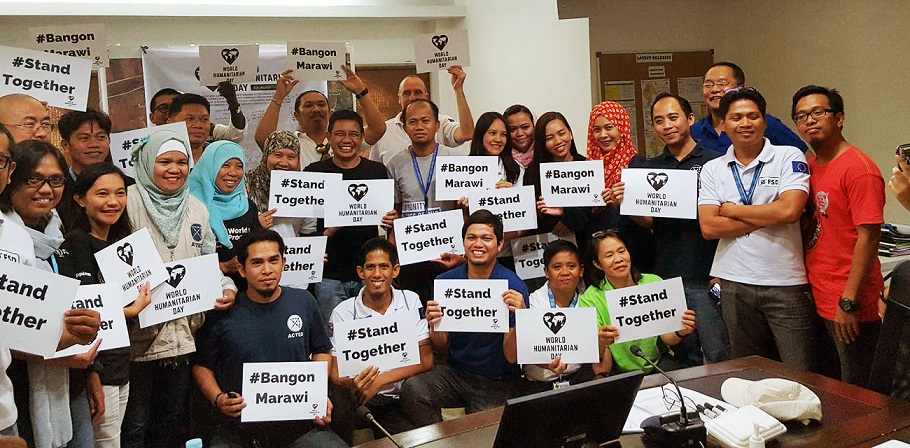
So far, there have been no confirmed human cases of avian flu. The Department of Health is leading the response on the human health side, with a focus on protecting transmission of infection to humans, early detection of possible human cases, and preparedness for treatment.